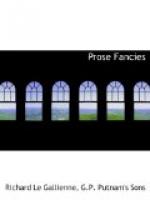Of course, there are other definitions of both. It is not so the maiden of seventeen defines a poet, as she looks up to him with brimming eyes in the summer sunset and calls him ‘her Byron.’ It is not so the embryo Chatterton defines him, chained to an office stool in some sooty provincial town, dreaming of Fleet Street as of a shining thoroughfare in the New Jerusalem, where move authors and poets, angelic beings, in ‘solemn troops and sweet societies.’ For, indeed, was that not the dream of all of us? For my part, I remember my first, most beautiful, delusion was that poets belonged only to the golden prime of the world, and that, like miracles, they had long ceased before the present age. And I very well recall my curious bewilderment when, one day in a bookseller’s, a friendly schoolmaster took up a new volume of Mr. Swinburne’s and told me that it was by the new great poet. How wonderful that little incident made the world for me! Real poets actually existing in this unromantic to-day! If you had told me of a mermaid, or a wood-nymph, or of the philosopher’s stone as apprehensible wonders, I should not have marvelled more. While a single poet existed in the land, who could say that the kingdom of Romance was all let out in building lots, or that the steam whistle had quite ‘frighted away the Dryads and the Fauns’?
Since then I have taken up the reviewing of minor verse as a part of my livelihood, and where I once saw the New Jerusalem I see now the New Journalism.
There are, doubtless, many who still cherish that boyish dream of the poet. He still stalks through the popular imagination with his Spanish hat and cloak, his amaranthine locks, his finely-frenzied eyes, and his Alastor-like forgetfulness of his meals. But only, it is to be feared, for a little time. For the latter-day poet is doing his best to dissipate that venerable tradition. Bitten by the modern passion for uniformity, he has French-cropped those locks, in which, as truly as with Samson, lay his strength, he has discarded his sombrero for a Lincoln and Bennett, he cultivates a silky moustache, a glossy boot, and has generally given himself into the hands of the West-End tailor. Stung beyond endurance by taunts of his unpracticality, he enters Parliament, edits papers, keeps accounts, and is in every way a better business man than his publisher.
This is all very well for a little time. The contrast amuses by its piquancy. To write of wild and whirling things in your books, but in public life to be associated with nothing more wild and whirling than a shirt-fronted eye-glassed hansom; to be at heart an Alastor, but in appearance a bank-clerk, delights an age of paradox.




